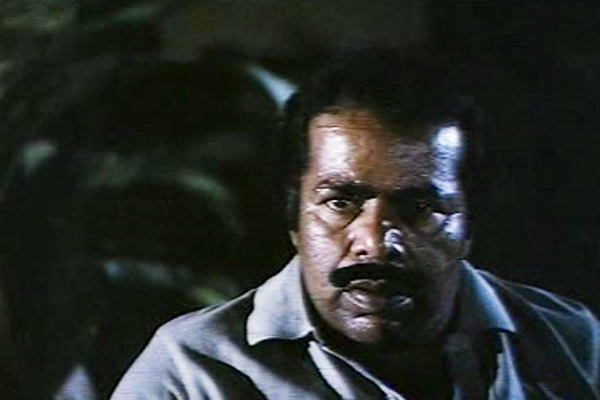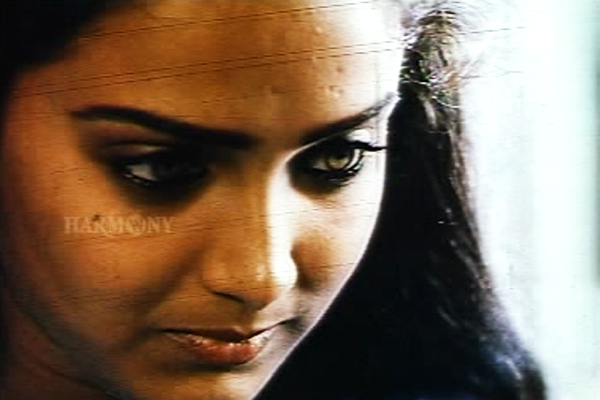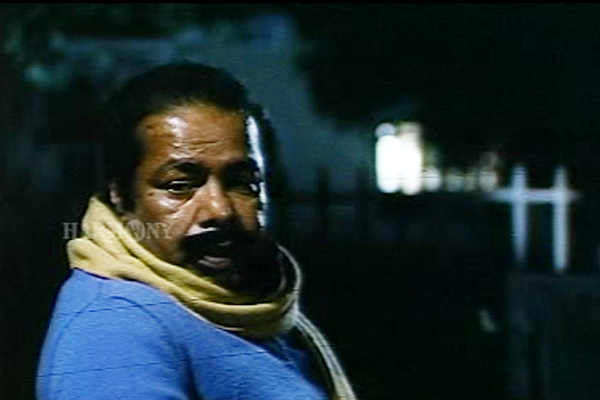
Hate is a strong word. For the one who feels it, it is at best an emotion. For the others, it is a cause for dissection, to conclude the primal reason for such a strong emotion. Most often, we encounter both these aspects ourselves, holding a particular reaction of hate under the scanner of reason long after we have experienced it.
For me, Thilakan as the step-father in Nammuku Paarkan Munthirithoppukal, was a role that inspired hate. He was pure scum incarnate, a persona clad in a hitched-up lungi, a testosterone-driven bare-chested beast covered in coils of black hair accentuating the lecherous energy associated with that role. He bristled on screen, a walking instance of psychic intent, his darting eyes and controlled aggression partially revealing an intent of no good.
In 1987, I watched Namukku Parkkan Munthiri Thoppukal (1986) on videotape for the first time. I have seen the movie, a few times ever since. The VCR was in business in those days, what with most Malayalis having a relative or two in the Gulf. The VCR was a luxury then, and most of the movies of the Eighties were released on VCR format by VGP (V G Paneerdas), a label that held rights to most Malayalam movies. My uncle, a ‘Gulfie’, came on vacation that year with a Siemens VCR in tow. Very heavy and big, compared to other VCRs, this one was typical German in terms of superior quality. And he brought lots of video cassettes for the family to watch.
The Siemens VCR.
Of course, that is also the time that the neighbourhood video-rental libraries came into prominence. And these libraries enjoyed a lot of attention from the local community. It was quite normal for a family to see a movie on the VCR every evening, considering the lacklustre fare dished out by state television, the Doordarshan. A kid from the family would rush out during siesta-time, to return the cassette borrowed the previous day, and borrow another based on the list the family sent through him. I liked hanging out at the library, the owners were youngsters themselves, in their early 20s. They seemed to like the attention too, and I liked the fact that they would talk to me. I felt grown up when they did that.
If you didn’t own a VCR at home, you could borrow it. The library had maybe 2 or 3 VCRs for circulation and the rental would be around Rs.50 for a day. The cassette rental was about Rs.10 per day. Most of the time, when someone returned a VCR or a cassette, the library owner would run a check if it was being returned in a working condition. I was witness to many a slanging match, since most of those who rented a VCR would utilise it to the maximum by watching at least 10 movies in a row. There is only so much a VCR can adjust to such indiscriminate use, and most often, it gave up, it’s gizzards fuming unable to withstand the constant usage.
Now when I look back, sans the wonder that permeates the perception of a 14-year old, these library owners were just older kids trying to make a fast buck while doing something respectable by the standards of their community. It was hard to escape that small village unless you went to Gulf just like anyone else and it seemed for a while, that owning a video lending library was glamorous. It wasn’t sustainable as a business, as they soon found out, and it was quite common to see new libraries springing in different parts of the village and shutting down not long after. They did well for a while but a business needs more than glamorous reasons to survive.
Coming back to Namukku Parkkan Munthiri Thoppukal (1986), even though we had a VCR at home, I watched the film at a house which I used to frequent for tuition in Math during school vacations. I remember it was the subtitled version, in English and Arabic.
And then, Thilakan just walked in.
Amidst the almost biblical overtones of Johnson’s music and that sliver of an ethereal conversation, centered on the Song of Songs, between the lead pair by a stunning white wicket fence separating their respective houses, Thilakan was a proverbial cat set amongst a flock of pigeons. It overpowered everything, a disturbing instance of violence in a metaphorical heaven created by Padmarajan on screen. It is in fact, evidenced by the hate I felt, one of Thilakan‘s better performances on screen. Padmarajan‘s genius lay in casting Thilakan for that role, a performance bristling with a gruff malevolence that walked in with the revolting grace of a stalking hyena.
The fear, a primal aspect that confronts his step-daughter on a daily basis, overturns the concept of home and it’s safety, symptomatic of a society that suffers the ignominy of its women having to face danger lurking within their own homes. The white wicket-gate is also a metaphor of divide, with the conversation between Mohanlal and Thilakan, the morning after they have a scuffle, taking place there. It is the moment that turns the story on its head, when pride makes its entry into the equation, where the step-father and the young neighbour are in the race to possess the same woman, albeit in two different ways.

Thilakan‘s aura is feral, his ex-serviceman character suffers from an inferiority complex vis-a-vis his neighbours who are better off. He expresses that trait of his by being roughshod with his wife and step-daughter, the women of the house.
Even though he inspires fear, he is an afraid animal himself, lurking most often in the shadows, acting high handed to conceal his lame inner core. Add to it his convoluted moral advantage of having married a single mother, which translates into his idea of uncompromising obedience by the women.
A classic example being his asking his wife to stand at a particular place before him, correcting her position to an inch so that he can resort to his questioning session, just as he and his colleague are having their evening drinks. It is a show of power in a demeaning way, and soon the situation snowballs into a major scuffle involving the neighbours.

The rape of the heroine, by her step-father, leaves us ravaged. And even though love finds its way in spite of it, one feels cheated for the singular slash across the face of love. We yearn for perfection in love, or let’s say perfection and love are synonymous with each other. In Namukku Parkkan Munthiri Thoppukal (1986), it turns out to be an illusion, filling us with hate for the one responsible for it. And if that’s how we felt, we must applaud Thilakan for his histrionics that eats into you like acid.

I have felt that the character portrayed by Thilakan hasnt been studied to the full extent͵ yet. Watching the movie͵ I felt like Padmarajan intended Thilakan to be planning to marry off his step daughter͵ to his friend (or fellow-drunkard – call it whichever you like). He also behaves relatively more affectionately with the second daughter – born of his own blood. The interest shown by Lal in the girl͵ upsets his plans͵ upsets his *standing* with his friend. Until now we have been seeing an unfair father͵ an uncultured͵ offensive person – whom we have seen in many movies. But in those movies we often tend to see the heroine getting locked up in her room until the intended wedding date͵ and either the hero effects a great rescue before the wedding͵ or it happens right at the time of the wedding͵ or the heroine takes her life…. quite a lot of options we have seen before. Now what makes this movie different is – (and I am coming to the movie Kanamarayathu soon) the villain is so filled with hate for the neighbour as to do a low and dastardly act that potentially ruins his own family life – after all he has a girl child of his own – but THAT remembrance is offset by an deep urge to see the neighbour disappointed͵ to see the hopes of the neighbour dashed! Now in Kanamarayathu the captain feels intensely jealous of the wannabe kid – whom he sees as a competitor to the affection of his lady love – with this difference – the lady is more independent to take her own decisions – and even tries to correct the Captain – which is unthinkable in the case of the poor stepdaughter. So the Captain turns his jealousy – turned – hatred directly at the kid – the victim cannot be raped – but had it been possible the Captain would have easily tried to castrate the kid ! The subsequent events in the movie Kanamarayathu makes me think a similar fate to the Captain is what possibly Padmarajan would have expected to have happened to Thilakan at the end.
MAMUKKUPARKKAN MUNTHIRITHOPPUKAL is a poem…not a movie……beyond words..beyond adjectives..i have seen it more than 100 times over the last 30 years….it is the symbol of pure and matured love..innocence…beauty…youthfulness…..energy…..clean environment……etc..etc..
You had me at “Thilakan, the scumbag”! Such a well written piece – you touched upon many different things here, but all tied up in that incomprehensible way that some works of art affect us. It took me years, and a move to the US, to actually get around to watching some of the Malayalam classics and feeling the pleasure they afforded – well, better late then never, eh? Thilakan was such an amazing actor – cannot say this enough. I despised the character he portrayed as much as you did, and no matter how expertly the screenplay/character delineation might have been in the script, Thilakan brings his trademark brand of naturalism to the role and elevates it from being just a caricature cinema baddie, to this memorable, revolting, fear-inducing one. You said “We yearn for perfection in love, or let’s say perfection and love are synonymous with each other” – but for me the message of the ending was that their love IS perfect, rising above societal mores of shudh, virginity etc. ( the usual cinema tropes); for the two of them, they are perfect for each other. That sounds quite banal when I say it, but that was my take away from the movie 🙂 Just discovered this site today and this is the second entry I’m reading and stopped by to commend you for the choice of topic and well-written piece.
Thank you, SN. Writing this piece was an unalloyed pleasure — something which evolved over years as a thought, gaining its potency. Glad you liked it. Yes, you are right about the ‘perfection in love’, it indeed is. Yet, before the ‘perfection’ gains relevance as an afterthought, we are ravaged by the ‘act’ unlike any other movie before it. As if it had happened to someone we knew, someone closer home.
How brilliantly have you written,I thoroughly enjoyed reading this piece.Just as classic was the movies,similarly you have written such a masterpiece.Thilakan in this role was just what you mentioned,a stalking hyena with such awesome mannerisms .Nobody else but the great thilakan could have done this to such perfection.It makes me wonder at the brilliance of this man and there is only one word which makes me understand how he did such roles,HIS PASSION ,otherwise you cant do such acts.I salute the master once again.
Thank you, Roy! I think it has a lot to do with a consummate actor like Thilakan. I enjoyed that movie thoroughly and the character essayed needed to be written about, both for its in-your-face bristle and accuracy.
One of the best movies ever made in India .
Yes, MP, it is a movie you could see over and over again without a fuss. Quite an under-rated movie until you begin to go beyond the gilt and dissect the undercurrents. A little film with a huge heart.
the era of VHS were the best time in my life as i had seen many many old movies in video cassetes.. even now, i am using a VCR to convert old malayalam movies which are no longer exist in any other modern formats.
and about NAMUKKU PAARKKAN MUNTHIRITHOPPUKAL… it is easily the best ROMANTIC FILM malayalam cinema has ever seen.. the chemistry between LAL and THILAKAN was outstanding…. and i love the climax of this film which is completely different from A PARUTHIVEERAN concept of modern era…
GN, thank you for writing in. I am sure you have tons of all those classics converted by now. We thank you for that. It is history that we are talking about, and the VCR for all its appeal was also an operating nightmare. The cassettes were vulnerable to fungus, and very often, you spent more time cleaning the VCR ‘head’ than actually watching the movie. Agree with NPMT being one of the best, and let’s not forget Padmarajan’s filmmaking and Johnson’s fabulous BGM.
Hellow Mr.Gopalakrishnan.I happened to read your comment and let me admit i am also in the same tune of mind as yours.I got more interested because you said that you are converting old malayalam VHS to CD.Can you advice me where can i find old VHS movies. Thank you-Praveen
scum incarnate, stalking hyena…. you could not have put it more succinctly! the very fact that even though it has been ages since i watched that movie, my skin simply crawls with revulsion every time i think of thilakan’s role in npm, is proof enough for how good an actor he is. and i swear no one else could have carried out that role to such repulsive perfection.
but that is no excuse. like u said, it was a slash across the face of love and the idyllic settings that padmarajan crafted.
the wonder box that was the vcr… brought back a bunch of memories too…
Thank you for writing in, Remitha. This piece came out of a conversation with CM, and we both agreed that the VCR, as a motif of the 80’s village landscape, was not adequately represented online. And what do we say about a consummate actor like Thilakan? He just carried the film on his brawny shoulders. Ask any woman who has watched NPMTand they will say exactly the same thing, the point of revulsion mentioned by you. I feel NPMT was never really given the credit it deserved and its is probably one of Malayalam’s greatest love stories on screen.
Thankyou so much Soni. great write up..I remember the VCR rental days of the mid- late 80s..;)of course remember seeing NPMT in 86…I was 13 and too young to understand the complex issues being played out in the movie 😉 took me a few years to grasp the story..
Sibi, thank you for writing in. Most of our greatest memories are ones that were not coloured by analysis. One’s younger years tend to have a lot of them. In the later years, even the rosiest of memories seem a tad duller when viewed through the lens of reason. I have seen NPMT several times by now, but it still maintains the innate beauty we know it for. It may not command superlatives; but it cannot be consigned to the reel-cans of pop mediocrity either.